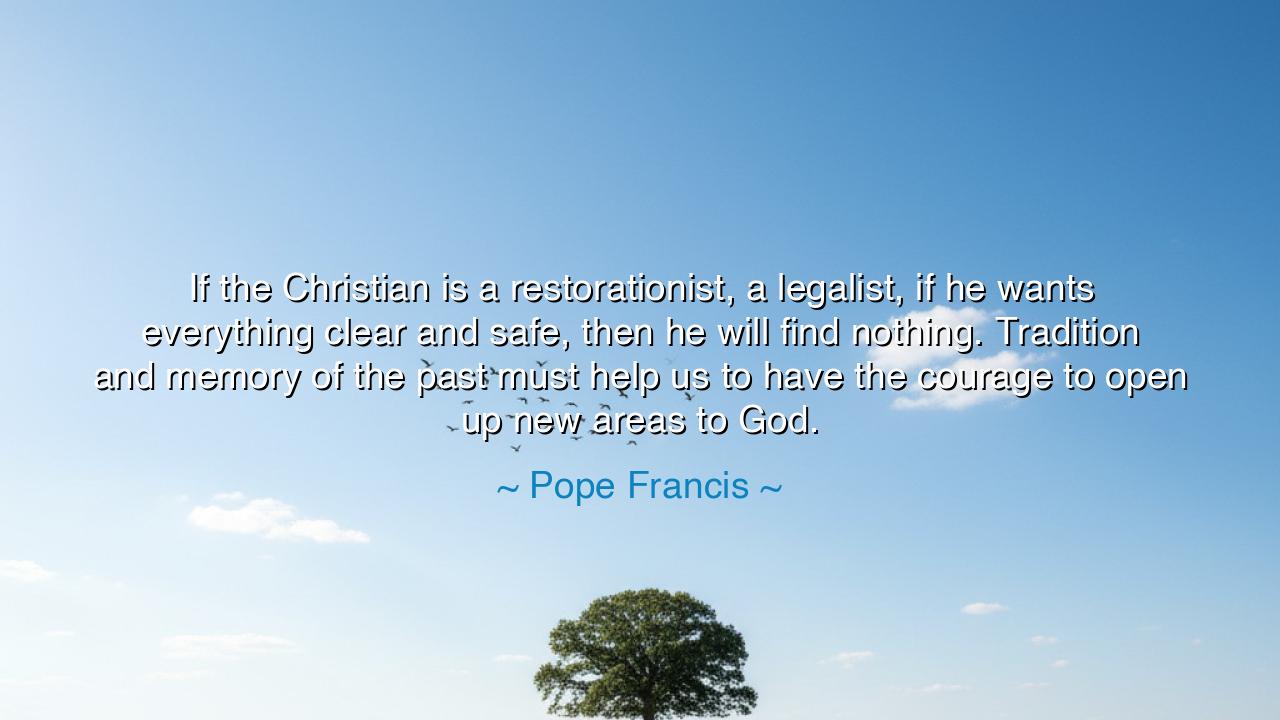
If the Christian is a restorationist, a legalist, if he wants
If the Christian is a restorationist, a legalist, if he wants everything clear and safe, then he will find nothing. Tradition and memory of the past must help us to have the courage to open up new areas to God.






“If the Christian is a restorationist, a legalist, if he wants everything clear and safe, then he will find nothing. Tradition and memory of the past must help us to have the courage to open up new areas to God.” — Thus spoke Pope Francis, shepherd of a weary age, calling souls from the comfort of certainty to the living adventure of faith. His words are a flame against the darkness of fear — a reminder that faith is not a museum of old relics, but a river that must continue to flow. To understand this saying is to understand that true tradition is not about preservation alone, but about renewal. The Christian heart must not hide behind the walls of law and safety, for God dwells not in stagnation, but in the ever-unfolding mystery of love.
When Pope Francis warns against being a restorationist or a legalist, he speaks against the temptation to make faith a cage instead of a path. A restorationist is one who wishes to drag the world back into an imagined golden past, while a legalist worships the letter of the law rather than its living spirit. Both, in their fear of change, shut the door to God’s surprises. Yet faith was never meant to be static — it was born of movement, of pilgrimage, of trust in what cannot be seen. The Israelites did not find God in Egypt’s stability, but in the wilderness. The apostles did not find Him in the synagogue’s order, but upon the stormy sea. To seek clarity and safety above all else is to refuse the mystery in which God reveals Himself.
And yet, Pope Francis does not despise the past. He honors it as a sacred wellspring — tradition and memory, he says, must not be thrown away, but used as torches to light the way forward. The faith of our ancestors is not a dead inheritance but a living root that nourishes new growth. The saints of old are not relics to be imitated blindly, but witnesses who teach us courage for our own time. True tradition, then, is not repetition but fidelity — fidelity to the same Spirit that once moved through them and still moves through us. The courage to “open up new areas to God” is not rebellion; it is obedience to the Spirit’s call, which always leads beyond what is known.
Consider the story of Saint Francis of Assisi, whose love burned through the crust of ritual and rule. In his time, the Church had grown rich, powerful, and fearful of loss. Yet this young man, clothed in rags, walked out from its comfort and embraced the lepers, the poor, the forgotten. The elders called him reckless, even heretical — but in his courage to open new areas to God, he revived the heart of Christianity itself. His way was not safe, not clear, but it was alive. He became a living flame of love, proving that the Spirit renews the Church not through control, but through holy audacity.
The origin of Pope Francis’s words lies in his lifelong conviction that faith must be dynamic — a dialogue between heaven and the present moment. As a Jesuit, he learned that to serve God is to “find Him in all things,” not to guard Him behind old walls. In a world trembling with change, he saw how many believers clung to rigidity, mistaking it for faithfulness. But he knew that fear is the enemy of faith, and that certainty, when idolized, kills the soul. His call is not to abandon doctrine, but to let doctrine breathe — to let love, mercy, and imagination guide us as they did the prophets of old.
For what is courage, if not the willingness to trust God beyond what we understand? The one who walks only where the ground is firm will never see the mountains of the Spirit. To open new areas to God means to let Him surprise us — in the stranger, in the poor, in science, in art, in every corner of creation. It means to believe that revelation is not finished, but continues in every heart that listens. The Church is not a fortress but a fire; it must spread, or it dies. To cling to safety is to extinguish its flame.
And so, my child of the eternal path, take these words as your compass: Do not seek safety in your faith; seek truth. Let the traditions of the past be your roots, but let courage be your wings. Do not hide behind rules when love calls you beyond them. Ask not for everything to be clear, for clarity belongs to the mind — but seek instead faith, which belongs to the heart. Step where there is no path, and you will find that God has already gone before you.
For in the end, the greatest act of faith is not to preserve what is known, but to trust that the God who once spoke in the desert still speaks in the whirlwind. The Christian who dares to listen — who lets go of fear and opens his soul to the new horizons of the divine — will find what the legalist never can: a faith alive, fierce, and free, blazing like the sun over an ever-new world.






AAdministratorAdministrator
Welcome, honored guests. Please leave a comment, we will respond soon